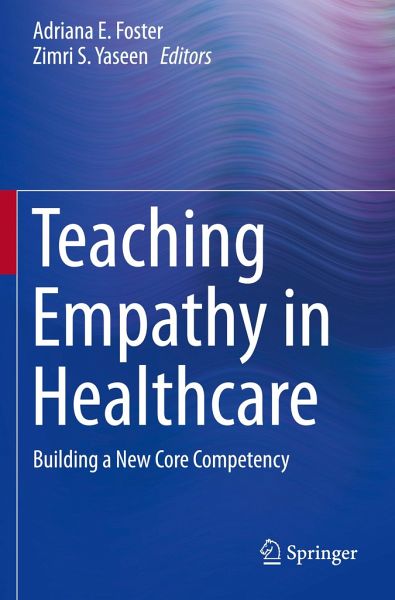
Teaching Empathy in Healthcare
Building a New Core Competency
Herausgegeben: Foster, Adriana E.; Yaseen, Zimri S.
Versandkostenfrei!
Versandfertig in 6-10 Tagen
91,99 €
inkl. MwSt.

PAYBACK Punkte
46 °P sammeln!
Empathy is essential to effectively engaging patients as partners in care. Clinicians' empathy is increasingly understood as a professional competency, a mode and process of relating that can be learned and taught. Communication and empathy training are penetrating healthcare professions curricula as knowledge about the most effective modalities to train, maintain, and deepen empathy grows. This book draws on a wide range of contributors across many disciplines, and takes an evidence-based and longitudinal approach to clinical empathy education. It takes the reader on an engaging journey from ...
Empathy is essential to effectively engaging patients as partners in care. Clinicians' empathy is increasingly understood as a professional competency, a mode and process of relating that can be learned and taught. Communication and empathy training are penetrating healthcare professions curricula as knowledge about the most effective modalities to train, maintain, and deepen empathy grows. This book draws on a wide range of contributors across many disciplines, and takes an evidence-based and longitudinal approach to clinical empathy education. It takes the reader on an engaging journey from understanding what empathy is (and how it can be measured), to approaches to empathy education informed by those understandings. It elaborates the benefits of embedding empathy training in graduate and post-graduate curricula and the importance of teaching empathy in accord with the clinician's stage of professional development. Finally, it examines systemic perspectives on empathyand empathy education in the clinical setting, addressing issues such as equity, stigma, and law. Each section is full of the latest evidence-based research, including, notably, the advances that have been made over recent decades in the neurobiology of empathy.
Perspectives among the interdisciplinary chapters include:
Neurobiology of empathy Measuring empathy in healthcare Teaching clinicians about affect Teaching cultural humility: Understanding the core of others by reflecting on ours Empathy and implicit bias: Can empathy training improve equity?
Teaching Empathy in Healthcare: Building a New Core Competency takes an innovative and comprehensive approach towards a developed understanding of empathy in the clinical context. This evidence-based book is set to become a classic text on the topic ofempathy in healthcare settings, and will appeal to a broad readership of clinicians, educators, and researchers in clinical medicine, neuroscience, behavioral health, and the social sciences, leaders in educational and professional organizations, and anyone interested in the healthcare services they utilize.
Perspectives among the interdisciplinary chapters include:
Neurobiology of empathy Measuring empathy in healthcare Teaching clinicians about affect Teaching cultural humility: Understanding the core of others by reflecting on ours Empathy and implicit bias: Can empathy training improve equity?
Teaching Empathy in Healthcare: Building a New Core Competency takes an innovative and comprehensive approach towards a developed understanding of empathy in the clinical context. This evidence-based book is set to become a classic text on the topic ofempathy in healthcare settings, and will appeal to a broad readership of clinicians, educators, and researchers in clinical medicine, neuroscience, behavioral health, and the social sciences, leaders in educational and professional organizations, and anyone interested in the healthcare services they utilize.














